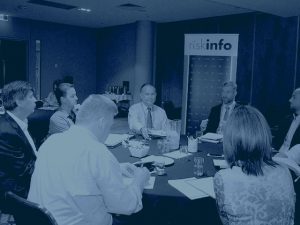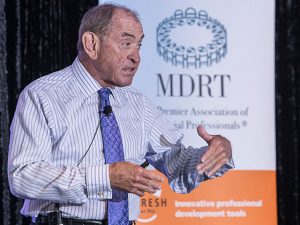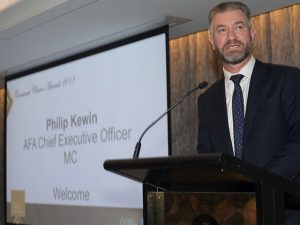Riskinfo joined with the AFA, Zurich Financial Services and financial advice representatives to discuss the road ahead for advice after another issues filled year.
During the course of the discussion, the panel unpacked some of the issues covered by the Royal Commission, as well as those it overlooked and the wider lack of understanding around life insurance advice and commissions.
Read on to find out what your fellow advisers and other industry stakeholders had to say about these issues.
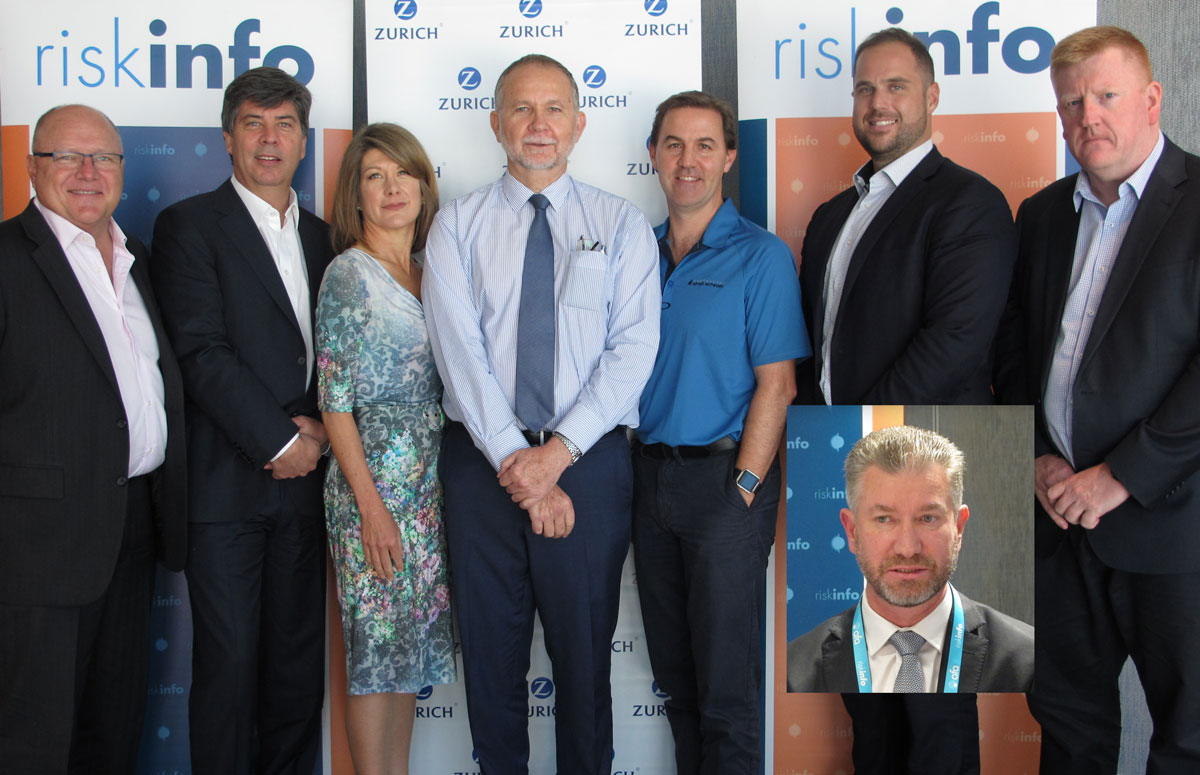
Panelists (L – R)
- Peter Sobels: Publisher, Riskinfo
- Marc Bineham: Principal Adviser, Noall and Co & National President, Association of Financial Advisers
- Kate McCallum: Adviser and Director, MultiForte Financial Services & Grand Finalist 2018 AFA Practice of the Year Award
- Tom Dawe: Principal Adviser, Capital Focussed & Grand Finalist 2018 AFA Adviser of the Year Award
- Troy Theobald: Adviser and Co-owner, Robina Financial Solutions & Grand Finalist 2014, 2015 AFA Practice of the Year Award
- Nathan Taggart: Head of Sales, Life Risk, Zurich Financial Services Australia
- Jason Spits: Senior Journalist, Riskinfo & Editor, Riskinfo Magazine
- Phil Kewin: Chief Executive, Association of Financial Advisers, Co-host (Inset)
Part 2
- Resolving Conflicts
- Unwinding Structures
- A New Platform
- Final Thoughts
Riskinfo joined with the AFA, Zurich Financial Services and financial advice representatives to discuss the road ahead for advice after another issues filled year.
In Part 1 of the discussion, the panel considered the impact of the Royal Commission, and the lack of understanding around life insurance advice and commissions.
In this Part 2, they examined how conflicts of interest could be managed, and how the unwinding of vertical integration in a post-Royal Commission landscape offered new platforms to promote the value of advice.
Read on to find out what your fellow advisers and other industry stakeholders had to say about these issues.
Resolving Conflicts
In considering how to deal with concerns raised at the Financial Services Royal Commission about the presence of commissions and the use of in-house products among vertically integrated advice groups, the panel reflected that while open approved products lists (APL) may be useful in addressing conflicts of interest, better disclosure and transparency was still required across the industry.
AFA Chief Executive, Phil Kewin reminded the panel the majority of submissions made in relation to the issues conflicts of interest raised during the hearings stated these were manageable, including ASIC, who had stated there were some advantages in the vertically integrated model for consumers if conflicts could be effectively managed.
Troy Theobald, adviser and co-owner of Robina Financial Solutions, believes institutions should be able to offer their own products but should also stand behind them in the market while making it clear if they have any vested interests in the people who may be providing advice to consumers.
“Consumers know and expect that if they contact a superannuation fund or a bank they are going to receive products and advice from those organisations. Consumers know if they go to a Toyota dealership they won’t be told about the features of a Mercedes Benz,” he said.
“What consumers do want to know is who ultimately owns the product and who is providing the advice and what muddies the waters is when institutions own a number of advice providers and consumers are unaware of that. It may be in the fine print in FSGs but are consumers being told that if they go to a group with a closed APL they will be getting products that come from within that group?” he added.
“Despite what we have heard at the Royal Commission I don’t think some of the large financial services institutions are trying to produce bad products, so they should stand behind them and deliver on them, and if they’re not good enough they won’t get the business and we have true competition,” he said.
Fellow adviser and co-owner of MultiForte Financial Services, Kate McCallum, agreed that transparency is a critical an issue for the advice sector.
“The key issue is transparency. If you go back to the early 2000’s, a client who walked into a bank branch knew that they would see an adviser from that bank, and they knew that the product that would be recommended would also be from the bank,” McCallum said.
“Earlier in my career I was with a major bank where part of my responsibility included managing an outbound insurance sales team. It was very clear when the team rang the bank’s customers that the offer was for our insurance product. If they needed advice, we asked if they would like to see one of our advisers. The approach was very, very transparent, and I think that’s been lost,” she added.
Picking up on Theobald’s and McCallum’s comments, Managing Director of Noall & Co, and National President of the AFA, Marc Bineham said conflicts of interest arose when product and advice providers decided to offer their own products alongside that of others but offered incentives to recommend the inhouse product.
“This is where the conflict has come from because it may have not been the best product, but the incentive was there. When there was only a single product, even if it was a bad product, then that was the problem of the bank or insurer providing that product, and not the adviser who worked for the company. So, if you are going to run a vertically integrated model, I would prefer the single product owned version and then there should be no conflict,” Bineham said.
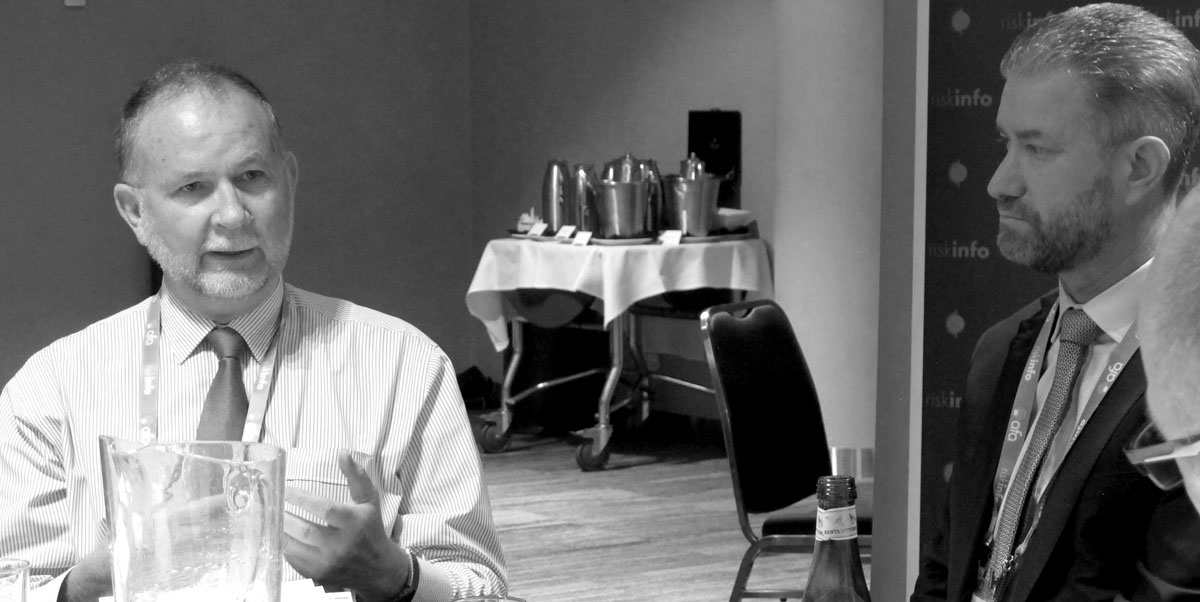
Unwinding Structures
That may soon be the case with the background to the panel discussion being the unwinding of the vertically integrated models held by a number of large financial services institutions. Is this then, an indication that conflicts of interest are too difficult to manage or that the vertically integrated model within financial services has run its course?
Continuing on, Bineham said it was unlikely that banks owning life insurance companies was going to be a strong long-term strategy, given the different underlying business models.
“It is difficult to have a model where a bank seeks to provide regular dividends and high profits when an insurance company would traditionally be content with a longer timeframe and were happy with single digit returns. There was a culture clash that was never working and that can be seen in some of the insurance companies that have been divested, how they now operate is chalk and cheese compared to a bank,” Bineham said, adding some of those insurers now have a greater focus on working with advisers again.
For McCallum the disconnect extended beyond life insurance, who said, “…it was the wealth management business in its entirety, and the culture of the traditional bank, they’re very hard to reconcile. Compared with the traditional bank business of deposits and mortgages, wealth management represents a higher risk and potentially a lower return.”
Kewin added that one of the positives is that financial advice will, in some cases, return to being a stand-alone business model, instead of something that has been treated as a division of a larger financial services provider.
Nathan Taggart, Head of Sales, Life Risk at Zurich Financial Services said the same shift is occurring in life insurance which is moving away from the ownership by local banks into the hands of overseas global insurers.
He added, “Zurich has taken invested more than $3 billion in the Australian life insurance market since 2015, and that is because we are very optimistic about the outlook for life insurance and the long term need for financial advice”.
A New Platform
While there is potential for advisers and insurers to build into the future, the Royal Commission highlighted a lack of understanding around what life insurance provides and how financial advisers operate (see Part 1). In this environment, how does the financial advice sector rebuild consumer trust, and move people from seeing insurance as ‘grudge purchase’ when only one in five people seek advice?
The answer, according to Kewin is to use the opportunity provided by the Financial Services Royal Commission to promote the fact that poor advice is not representative of the majority of advisers and the positive outcomes that come from life insurance.
“One thing that will come out of the Royal Commission is we will see institutions are going to clean up their act and there will be a large focus on people doing things the right way. That will also be our opportunity to promote the narrative that poor advice isn’t the norm and it actually change people’s lives,” he said.
“What happens after the Commission will give us that platform, because there will be people in the media who want to talk to us about these issues and we can bring these issues to the fore. When we talk with MPs they are interested in the real numbers and if we can demonstrate to them, and the public, the value of advice we have great opportunity to improve perceptions,” Kewin added.
Pointing to statistics released by The Risk Store which found that more than $9 billion was paid out in claims in 2016, and ASIC’s research that 92 percent of claims were paid in the first instance, Kewin said the life insurance and advice sector had very good facts to promote.
“This discussion has been about advice but central to these figures is that advised life insurance products also deliver on their promises. Life insurers don’t sit there and collect premiums and do nothing with the money. Premiums are used for paying clients claims and people’s lives are improved as a result. And that’s another component of the message that we need to get across,” he said.
As someone familiar with the provision of life insurance product, Taggart said his firm regularly receives confirmation of the value and importance of its product, and the advice provided alongside it.

“We get emails every single day from claimants talking about how important their insurance has been and why they have valued it so much. These testimonials hold the key to rebuilding that lost trust and as an industry we need to do a better job of sharing these stories,” Taggart said.
“At present, the spotlight is on the Royal Commission, but we want to promote the value of insurance much more because it is a positive thing and it does a lot of good for those insured, their families and the wider community,” he added.
Picking up on the idea of using statistics and claims numbers to promote the benefits of advice and insurance, financial adviser and Principal with Capital Focussed, Tom Dawe believes that stories about consumers, told to other consumers, will resonate and provide balance to the current crop of negative coverage.
“So far, the only examinations we’ve had of financial advice and life insurance have been focused on wrong doing without looking at the other side of the story. They have not looked at people who have been helped through the process, or how claim’s benefits actually work in the lives of people and the consequence of billions of dollars being paid out each year, and the consequences of the void when people don’t have cover,” Dawe said.
“We don’t need an advertising campaign but a massive public relations effort and we have got good reasons to show the positive outcomes that are the other side of the story that is often presented, and will allow us to regain a balanced view,” Dawe continued.
“As Kate mentioned earlier, insurance has a long history and it was put in place to ensure the families of the insured were looked after. I often tell clients who have been paying premiums for a number of years to bear in mind other people have been benefiting from those as well, and do they have a problem with that? For them, it creates a perspective about the wider benefit,” he added.
In the face of intensive examination like that seen at the Royal Commission, Bineham said the worst action the financial advice sector can take is stay silent, particularly with mainstream media and consumers who engage with it.
He added that to date, mainstream media has not engaged widely with the advice and insurance sector, except when there has been negative news but the current environment has created an opportunity to change the mindset and “…they may not agree with us but at least they will give us a hearing whereas two or three years ago they were far less interested in hearing our views or taking our calls”.
McCallum also sees the consumer as being the centre of any further conversations about the future of advice and life insurance but suggests advisers boost the profile and voice of their clients and let them tell the story.
“We need to demonstrate that we’re listening to and tuned in with the end consumer but at the moment we’ve all got the microphone. It’s not the consumer who is standing up and saying ‘I love my adviser’. That message is still mediated through us as advisers and we should throw it over to consumers and clients and let them have a louder voice in the conversation,” McCallum observed.
“Instead of interviewing them about what we do, we should be asking them about their experiences in seeking advice. Tell us how you found the process of being advised on insurance, or claiming on insurance, or having to live off your insurance benefit. What has caused you to worry and what has been positive about your experiences?” she added.
“At the moment, we tend to focus on the person who has had a claim and has needed insurance, and that’s been the value story. We have to talk about the wider story which is: will my client be able to say they sleep better every night knowing they have cover and if need be can confidently make a claim on it,” McCallum said.
Final Thoughts
In bringing the conversation to a close, the panel finished off looking to the future, each one confident that despite the negative news and perceptions which have been a constant in 2018, that financial advice still had a place, a voice and a valuable role to play.

For Taggart, that role was as a partner in the provision of advice. “I said this upfront but its worth repeating, and that is we need a strong and viable advice community and profession to have a successful life insurance industry. For us, as an independent insurer, without advisers like yourself we don’t have a business. To use a cliché, we’re on the journey together with advisers but there will be some changes coming, and we believe advisers and insurers can work through them to the best of our abilities and hopefully continue to share in success in the future.”
Kewin saw that role as being able to provide peace of mind that went beyond having the right insurance and getting that message out to many more people. “The challenge for us is what we have to do differently in shaping and telling the narrative about the value of advice and educating the general public. We are aware of the financial and mental wellbeing that advice can give you, and the wider benefits to society in general, and the while the education process will be step by step, we can use the negative experiences of this year as a platform upon which to build our message”.
For Dawe, the role of advice and advisers was to continue to articulate, in real terms, what they do including the adoption of a single message about the benefits of advice. “Apart from a public-relations push we should create a single set of information, such as an infographic, which we can use whenever we are addressing the media. We should be highlighting how much life insurance is inforce at any time, and if every single policy was paid out tomorrow how much would policy holders receive, and what are the major causes of claims and how are people being assisted every day. We can do this as an industry, and it goes beyond the idea that we just sell product, but articulate directly what we do and the real and potential benefits that exist within our industry.”
Theobald would like to see the end of insurance as a grudge purchase and for people to see it as a necessity which may require more contact and involvement from advisers. “When it comes to insurance being a grudge-purchase we need to change people’s view from something they have to buy to something that is there when they need to call on it. People pay golf memberships so when they want to play golf they can do so. People pay for their kids’ education so when the kids turn up to school, it is there. We should be talking about insurance the same way so when something terrible happens to a client, the money is there. As advisers we’re making sure while it may not be a great priority every day, when it does become the biggest issue in their life, they have the right cover at claim time and we have kept them on track to ensure that happens.”

For Bineham, continuing to build relationships, particularly with those who have yet to seek advice was his focus for the future, even if it meant adopting more technology to create a more personal approach to advice. “I’m a great believer that human contact and building relationships is all important, now and in the future. I don’t believe an app can do that and I do see that for the 20 percent of clients that get advice they really appreciate the personal approach. The question is how can we do better for the 80 percent of people without advice who seemingly are not interested in paying for advice. I see the future is having the human touch but building robotech to make advice far more efficient, and at lower price points. That is where I would like to see us going, taking advantage of robotech but still using the human touch to allow people to receive the appropriate amount of advice and insurance in this case and ensure everyone has an appropriate safety net for them and their family.”
McCallum reminded her advice and industry peers that regardless of what has happened, the advice sector was not beholden to the past, and still had control of its future. “At the moment, we are being carried by the tide and, unfortunately, the tide has pushed into this very negative territory but, as Phil said, it’s an opportunity for us to switch it around. It’s a time to say, if we had a blank sheet of paper what would we dream to be ideal? What would we design as an advice community? For me, I come back to the need for a client driven value model where the client has a very clear proposition. That clear proposition would deliver what is most important for the client, it would provide them with value and give them peace of mind.”


